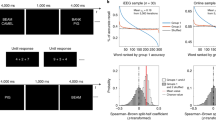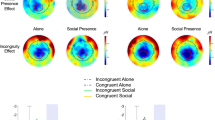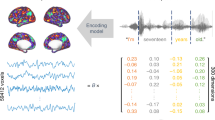Abstract
This study investigated the ability of individuals with amnesia to acquire referential labels across a series of collaborative, dynamic interactions with a communication partner. Despite their inability to learn arbitrary relations in paired-associate learning, the amnesic patients showed remarkably robust collaborative learning across trials, at a rate equal to that of normal comparison subjects. The amnesic participants' learning resulted in their arriving at labels for a set of abstract shapes (tangrams), thus facilitating rapid and efficient communication. The labels generated and used by the amnesics during interactions with their partners became simpler across trials, with most labels stabilizing long before the end of training and then being used consistently throughout; moreover, they endured long after the task had ended. These findings have important implications for understanding the memory systems involved in semantic learning and in acquiring shared knowledge ('common ground') among communication partners, and the nature of hippocampal-dependent versus hippocampal-independent learning.
This is a preview of subscription content, access via your institution
Access options
Subscribe to this journal
Receive 12 print issues and online access
$209.00 per year
only $17.42 per issue
Buy this article
- Purchase on Springer Link
- Instant access to full article PDF
Prices may be subject to local taxes which are calculated during checkout



Similar content being viewed by others
References
Clark, H. Arenas of Language Use. (University of Chicago Press, Chicago, 1992).
Cohen, N.J. Preserved learning capacity in amnesia: evidence for multiple memory systems. in The Neuropsychology of Memory (eds. Butters, N. & Squire, L.R.) 83–103 (Guilford Press, New York, 1984).
Cohen, N.J. Declarative memory. in Learning and Memory 2nd edn. (ed. Byrne, J.H.) (Macmillan Library Reference, New York, 2003).
Cohen, N.J. & Eichenbaum, H. Memory, Amnesia and the Hippocampal System. (MIT Press, Cambridge, Massachusetts, 1993).
Eichenbaum, H. & Cohen, N.J. From Conditioning to Conscious Recollection: Memory Systems of the Brain. (Oxford Univ. Press, New York, 2001).
Gabrieli, J.D. Cognitive neuroscience of human memory. Annu. Rev. Psychol. 49, 87–115 (1998).
Squire, L.R. Memory and the hippocampus: a synthesis from findings with rats, monkeys, and humans. Psychol. Rev. 99, 195–231 (1992).
MacKay, D.G., Burke, D.M. & Stewart, R.H. M's language production deficits: implications for relations between memory, semantic binding, and the hippocampal system. J. Mem. Lang. 38, 28–69 (1998).
MacKay, D.G., Stewart, R. & Burke, D.M. H.M. revisited: relations between language, comprehension, memory and the hippocampal system. J. Cogn. Neurosci. 10, 377–394 (1998).
MacKay, D.G. & James, L.E. The binding problem for syntax, semantics, and prosody: H.M.'s selective sentence reading deficits under the theoretical-syndrome approach. Lang. Cogn. Process. 16, 419–460 (2001).
Clark, H. & Wilkes-Gibbs, D. Referring as a collaborative process. Cognition 22, 1–39 (1986).
Hengst, J. Collaborative referencing between individuals with aphasia and routine communication partners. J. Speech Lang. Hear. Res. 46, 831–848 (2003).
Cohen, N.J., Poldrack, R. & Eichenbaum, H. Memory for items and memory for relations in the procedural/declarative memory framework. in Theories of Organic Amnesia (eds. Mayes, A. & Downes, J.) 131–178 (Psychology Press, Hove, UK, 1997).
Cohen, N.J. et al. Hippocampal system and declarative (relational) memory: summarizing the data from functional neuroimaging studies. Hippocampus 9, 83–98 (1999).
Ryan, J.D., Althoff, R.R., Whitlow, S. & Cohen, N.J. Amnesia is a deficit in relational memory. Psychol. Sci. 11, 454–461 (2000).
Ryan, J. & Cohen, N.J. The nature of change detection and online representations of scenes. J. Exp. Psychol. Hum. Percept. Perform. 30, 988–1015 (2004).
Gabrieli, J.D., Cohen, N.J. & Corkin, S. The impaired learning of semantic knowledge following bilateral medial temporal-lobe resection. Brain Cogn. 7, 157–177 (1988).
O'Kane, G., Kensinger, E.A. & Corkin, S. Evidence for semantic learning in profound amnesia: an investigation with patient H.M. Hipppocampus 14, 417–425 (2004).
Bayley, P.J. & Squire, L.R. Medial temporal lobe amnesia: gradual acquisition of factual information by nondeclarative memory. J. Neurosci. 22, 5741–5748 (2002).
Wilson, B.A. & Wearing, D. Prisoner of consciousness: a state of just awakening following herpes simplex encephalitis. in Broken Memories: Case Studies in Memory Impairment (eds. Campbell, R. & Conway, M.A.) 14–30 (Blackwell, Cambridge, Massachusetts, 1995).
Kovner, R., Mattis, S. & Goldmeier, E. A technique for promoting robust free recall in chronic organic amnesia. J. Clin. Neuropsychol. 5, 65–71 (1983).
Tulving, E., Hayman, C.A. & Macdonald, C. Long-lasting perceptual priming and semantic learning in amnesia: a case experiment. J. Exp. Psychol. Learn. Mem. Cogn. 17, 595–617 (1991).
Eichenbaum, H. Hippocampus: cognitive processes and neural representations that underlie declarative memory. Neuron 44, 109–120 (2004).
Squire, L.R., Cohen, N.J. & Nadel, L. The medial temporal region and memory consolidation: a new hypothesis. in Memory Consolidation (eds. Weingartner, H. & Parker, E.) 185–210 (Erlbaum, Hillsdale, New Jersey, 1984).
Teyler, T.J. & DiScenna, P. The role of hippocampus in memory: a hypothesis. Neurosci. Biobehav. Rev. 9, 377–389 (1985).
Damasio, A.R. Time-locked multiregional retroactivation: a systems-level proposal for the neural substrates of recall and recognition. Cognition 33, 25–62 (1989).
McClelland, J.L., McNaughton, B.L. & O'Reilly, R.C. Why there are complementary learning systems in the hippocampus and neocortex: insights from the successes and failures of connectionist models of learning and memory. Psychol. Rev. 102, 419–457 (1995).
O'Reilly, R.C. & Rudy, J.W. Computational principles of learning in the neocortex and hippocampus. Hippocampus 10, 389–397 (2000).
Vargha-Khadem, F. et al. Differential effects of early hippocampal pathology on episodic and semantic memory. Science 277, 376–380 (1997).
Skotko, B. et al. Puzzling thoughts for H.M.: can new semantic information be anchored to old semantic memories? Neuropsychology 18, 756–769 (2004).
Allen, J.S., Tranel, D., Bruss, J. & Damasio, H. Correlations between regional brain volumes and memory performance in anoxia. J. Clin. Exp. Neuropsychol. (in the press).
Wechsler, D. Wechsler Memory Scale 3rd edn. (Psychological Corporation, New York, 1997).
Wechsler, D. Wechsler Adult Intelligence Scale 3rd edn. (Psychological Corporation, New York, 1997).
Elffers, J. & Schuyt, M. Tangram: 1600 Ancient Chinese Puzzles. (Barnes & Nobel, Hong Kong, 1997).
Acknowledgements
We thank W. Viechtbauer for conducting the statistical analyses, and K. McEnery, S. McWalter, C. Slovin and E. Whitebread for transcribing the sessions. This work was supported by grants from the US National Institute of Mental Health and National Science Foundation (N.J.C.) and the National Institute of Neurological Disorders and Stroke (D.T.).
Author information
Authors and Affiliations
Corresponding author
Ethics declarations
Competing interests
The authors declare no competing financial interests.
Supplementary information
Supplementary Fig. 1
Total word counts per trial. (PDF 85 kb)
Supplementary Table 1
Demographic Information and Neuropsychological Assessment of Amnesic Participants (PDF 37 kb)
Supplementary Table 2
Card descriptions on trial 1 by an amnesic individual and partner (PDF 90 kb)
Rights and permissions
About this article
Cite this article
Duff, M., Hengst, J., Tranel, D. et al. Development of shared information in communication despite hippocampal amnesia. Nat Neurosci 9, 140–146 (2006). https://doi.org/10.1038/nn1601
Received:
Accepted:
Published:
Issue Date:
DOI: https://doi.org/10.1038/nn1601
This article is cited by
-
Towards a Measurable Substance of Organizational Knowledge
Journal of the Knowledge Economy (2023)
-
A model for memory systems based on processing modes rather than consciousness
Nature Reviews Neuroscience (2010)



